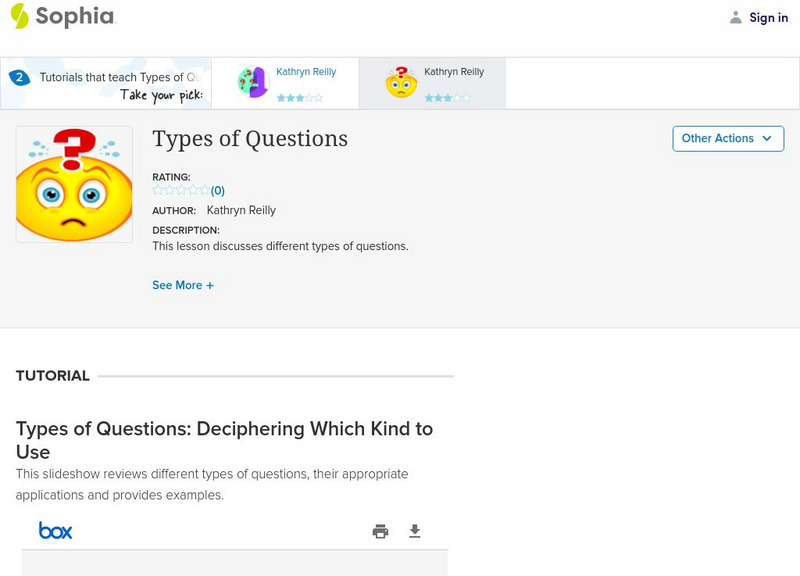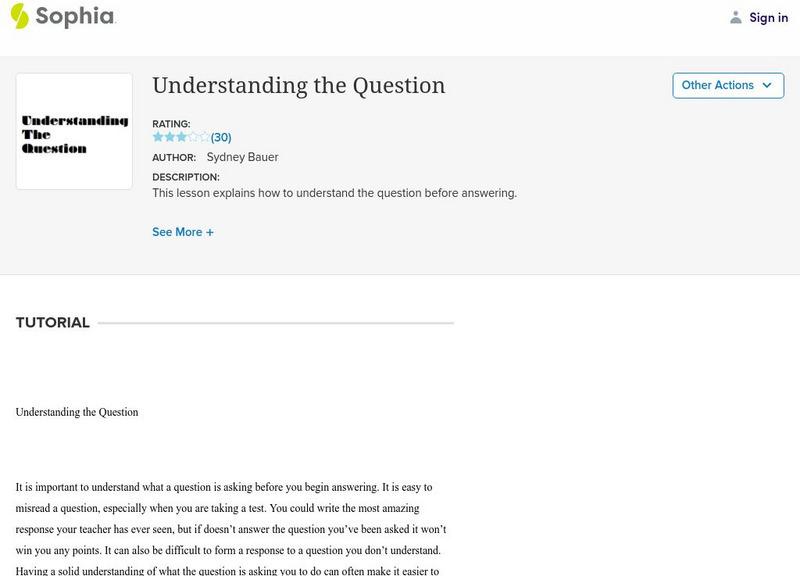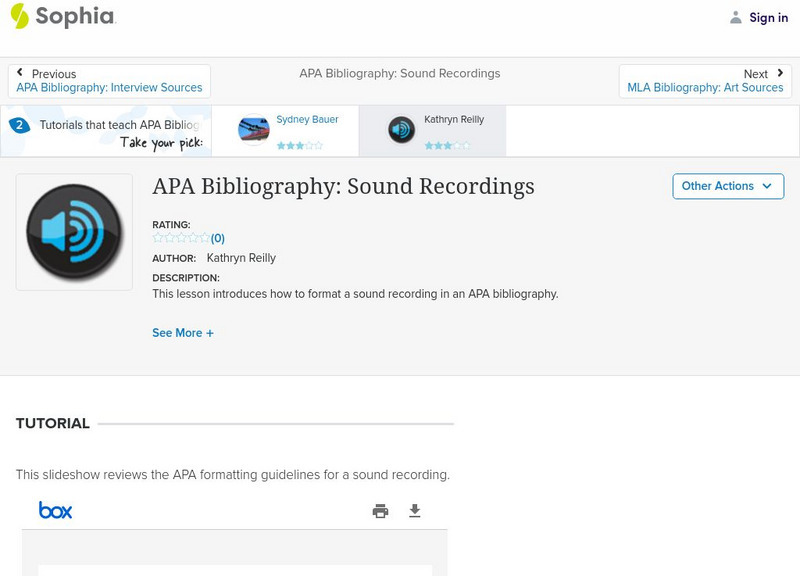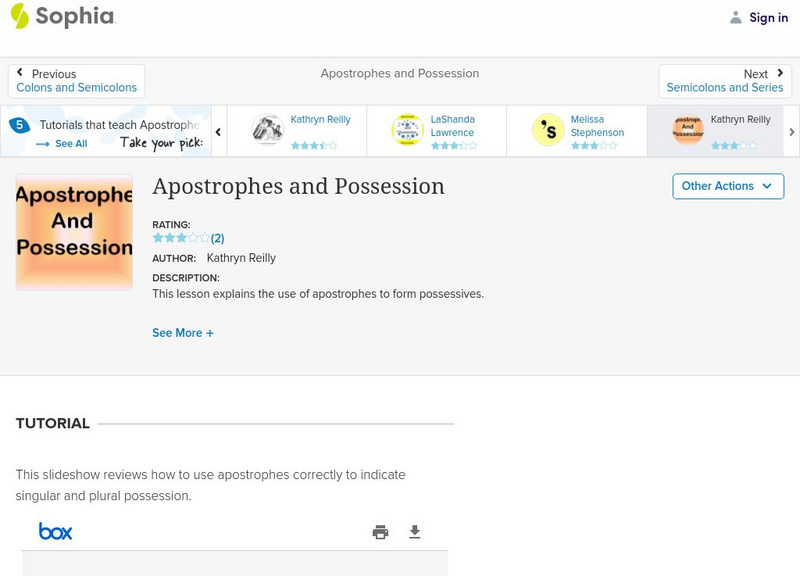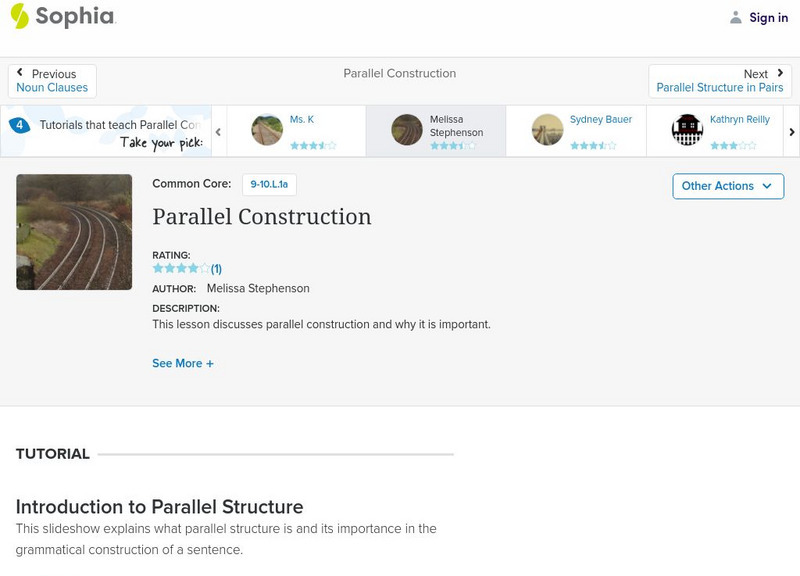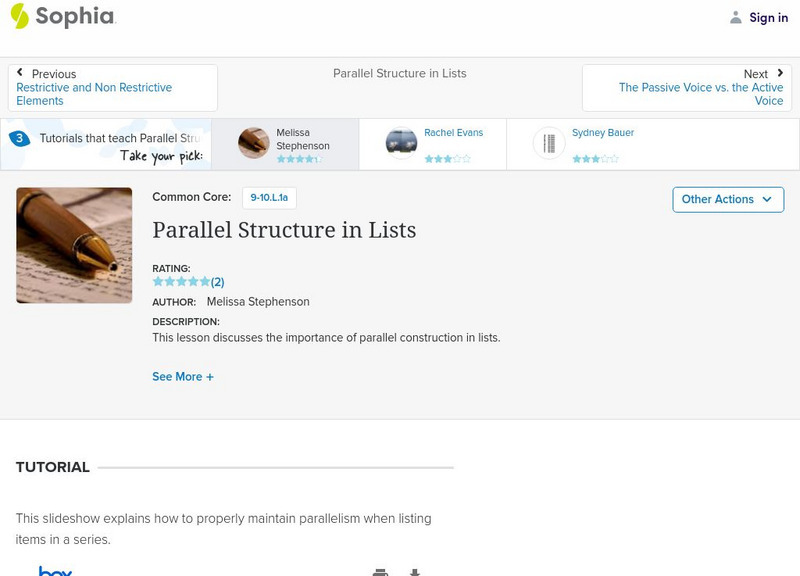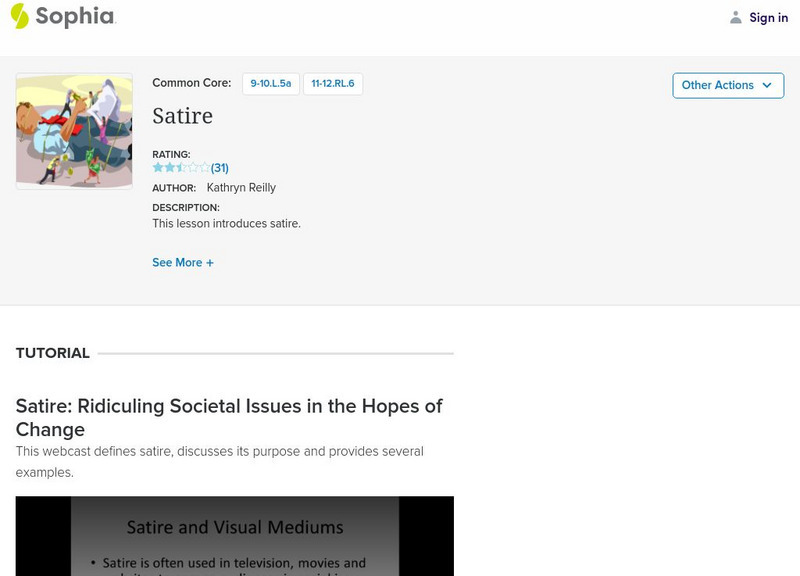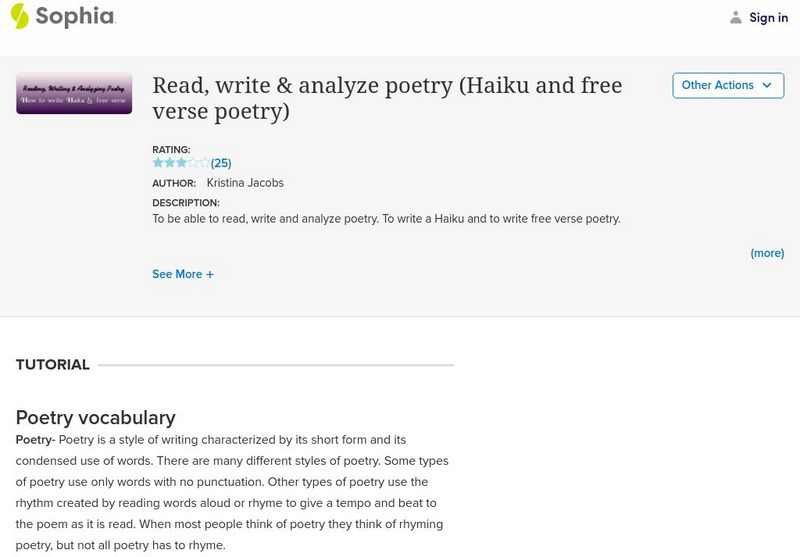Sophia Learning
Sophia: The Passive Voice
This slideshow lesson focuses on the passive voice. It defines it, explains the effective uses of passive voice, discusses how to write effective sentences using passive voice, and provides examples.
Sophia Learning
Sophia: Thesis Statement
This slideshow lesson focuses on thesis statements. It lists, defines, and provides examples of three types of thesis statements: analytical, expository, and argumentative. It discusses the location of the thesis in the paper and offers...
Sophia Learning
Sophia: Thesis Statement
This slideshow lesson focuses on thesis statements; it defines thesis and its purpose. It explains the three types of thesis statements: analytical, expository, and argumentative; offers questions to ask about the thesis to determine if...
Sophia Learning
Sophia: Topic Sentences
This slideshow lesson focuses on topic sentences; it defines them, gives the characteristics of effective topic sentences, tells what they are NOT, discusses how to create them, and provides examples of effective topic sentences.
Sophia Learning
Sophia: Types of Questions
This slideshow lesson focuses on types of questions; it provides background, purpose, and a list of the seven types of questions: rhetorical, direct or interrogative, indirect, open-ended, closed, and embedded. It provides background and...
Sophia Learning
Sophia: Understanding the Question
This lesson focuses on how to understand a reading question; it details three main parts: look for content and process words, state the question in your own words, and restate the question as a statement. It explains each and provides...
Sophia Learning
Sophia: Using Sentence Structure (Part of Speech)
This slideshow lesson focuses on using sentence structure and parts of speech to determine the meaning of unfamiliar words. It explains how to look for parentheses or commas after unfamiliar words to help determine meaning; it also shows...
Sophia Learning
Sophia: Vocab Tip: Hear It Said Out Loud
This video lesson focuses on the strategy of hearing unfamiliar vocabulary said aloud. The advantages of hearing it said aloud include activating prior knowledge and the brain remembering it better. It offers ways to learn the...
Sophia Learning
Sophia: Vocabulary Words
This lesson focuses on the need to look up vocabulary words when given a list from an assigned reading to help better understand the text. It offers a literary example of such a list. This information is provided in text and in audio...
Sophia Learning
Sophia: Additive Transition Words
This slideshow lesson focuses on additive transition words; it defines transition words and lists the categories. It explains what additive transitions do and when to use them, it provides a list of additive transition words and example...
Sophia Learning
Sophia: Adjective Clauses and Relative Pronouns
This slideshow lesson focuses on adjective clauses and relative pronouns; it discusses the purpose of adjective clauses and the three conditions required to be an adjective clause. It provides the two adjective clause formulas with...
Sophia Learning
Sophia: Antithesis
This slideshow lesson focuses on antithesis; it defines it and explains its uses: to acknowledge the complexity of the situation, to emphasize contrast, and to create a balance between opposites.
Sophia Learning
Sophia: Apa Bibliography: Sound Recording
This slideshow lesson focuses on APA formatting for sound recordings; it gives the general guidelines for APA formatting and for sound recordings. It offers examples and where to find more information if needed.
Sophia Learning
Sophia: Apostrophes and Possession
This slideshow lesson focuses on the use of apostrophes in forming possessives; it defines apostrophe and lists its purposes. It lists two types of possessives, singular and plural, explains how to form each including the placement of...
Sophia Learning
Sophia: Appositives
This slideshow lesson focuses on appositives by defining them, showing they can have modifiers, explaining when to use/not use commas, and how to use dashes, parenthesis, and colons with appositives.
Sophia Learning
Sophia: Appropriateness of Sentence Fragments
This slideshow lesson focuses on the appropriateness of sentence fragments. It defines sentence fragments and discusses how writers use them: to gain the reader's attention, to emphasize an important word or phrase, to answer a question,...
Sophia Learning
Sophia: Avoiding Digressions
This lesson focuses on avoiding digressions when answering questions; it defines digressions, discusses the reasons to avoid them, and explains how to avoid them in both text and audio formats.
Sophia Learning
Sophia: Parallel Construction
This slideshow lesson focuses on parallel structure; it defines parallelism and compares it to train tracks. It offers examples, purpose, and usage.
Sophia Learning
Sophia: Parallel Structure
This slideshow lesson focuses on parallel structure; it provides the rules for parallel structure with items in a series and in comparisons using "than" or "as." It also offers examples of each with and without parallel structure.
Sophia Learning
Sophia: Satire
This video lesson focuses on satire including its definition, its purpose, how it works, media examples, and literary examples. Real Player is required.
Sophia Learning
Sophia: Brackets 8
This slideshow lesson focuses on the use of brackets. It lists 5 uses for brackets and discusses each one separately with examples showing proper use. The 5 uses are as follows: an insertion, within parentheses, a change in a quotation,...
Sophia Learning
Sophia: Adjectives and Adverbs 5
This slideshow lesson focuses on adjectives and adverbs. After looking at the similarities between them, it discusses each individually including their purpose, location, the questions they answer, and examples for each.
ClassFlow
Class Flow: Nutrition Facts Labels
This lesson focuses on how to read nutrition and ingredient labels. A quiz is provided at the end of the slideshow.
Sophia Learning
Sophia: Read, Write, and Analyze Poetry (Haiku and Free Verse Poetry)
This tutorial focuses on poetry; it defines free verse and haiku, explains how to write each, and provides examples. It offers a slideshow which provides tips for beginners on how to read poetry, how to identify types of poetry, and how...
Other popular searches
- Lesson Plans on Fables
- Lesson Plan on Microscopes
- Lesson Plans on Bias
- Lesson Plans on Death
- Lesson Plans on Oceans
- Lesson on Geometry Proofs
- Lesson Plan on Keyboard
- Lesson on Making Predictions
- Lesson Plan on Homographs
- Lesson Plans on Heredity
- Lesson Plan on Phonics
- Lesson on Media Education






